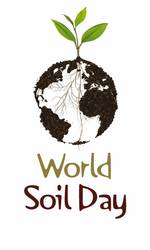05 December 2020, Kandy – Every year the Food and Agriculture Organization of the United Nations (FAO) marks World Soil Day on 05 December to educate and create awareness on the importance of soil and highlight threats and issues faced by global soil resources. Each year the World Soil Day theme is selected to highlight a specific soil related issue.
This year’s theme "Keep soil alive, protect soil biodiversity" focuses attention on the workers belowground - from tiny bacteria to agile millipedes and slimy earthworms - all of which contribute to processes that are indispensable to life on Earth.
Today biodiversity loss is a worry which means soil is also affected. Soil is home to more than 1/4 of the planet’s biodiversity. Yet, we only know 1% of this universe.
Soil is a living resource. There are more living creatures in a single teaspoon of healthy soil than there are people on earth. Plants and animals above and below ground depend on the complex processes and interactions taking place in the soil. Unfortunately, the attention mainly goes to those species that are visible to the human eyes, while we tend to ignore those under our feet. Plants nurture a whole world of creatures in the soil that in return feed and protect the plants. But soil biodiversity is under pressure. Unsustainable soil management affects life belowground.
Food security
“Soil is an ecological system and it is a finite resource, meaning its loss and degradation is not recoverable within a human lifespan. Conservation of soil biodiversity and soil organic carbon through sustainable farming practices is essential to improve soil health and agricultural productivity,” said FAO Representative for Sri Lanka and the Maldives, Dr Xuebing Sun.
Dr Sun reiterated that fighting loss of soil biodiversity is key to global food security and the achievement of more than half of the Sustainable Development Goals. Soil biodiversity plays a vital role in the soil ecosystem as soil organisms are responsible for nutrient cycling, regulating the dynamics of soil organic matter, soil carbon sequestration and greenhouse gas emissions, and allowing soils to function properly. Soil biodiversity plays a central role in preserving human health through a range of pathways including water purification, climate stabilization, and nutrient and food security. Plants surrounded by biodiverse soils also have a greater resilience against pests and diseases.
In Sri Lanka, programmes are being implemented to support Sustainable Land Management (SLM) through Sustainable Soil Management (SSM) practices. Promotion of site-specific fertilizer application which was piloted in 2017 by the Department of Agriculture with funding from FAO is one initiative. A vast majority of farmers apply inorganic fertilizer and agrochemicals indiscriminately to their crops. This leads to environmental pollution such as soil pollution, and contamination of surface and groundwater sources which impact human health. Soil test kits and plant test kits were introduced to encourage farmers to test their soil fertility level before fertilizer
application. This has resulted in a nearly 40 percent reduction in inorganic fertilizer application in areas where site specific fertilizer application was practiced, and steps are being taken to make these test kits widely available across the country.
Approximately 50 percent of agricultural lands in the Central Highlands of Sri Lanka are in a degraded condition which has adversely impacted the livelihoods of farmers. Soil biodiversity losses has been recognized as a main issue in the Central Highlands especially in farmlands and estates. The Rehabilitation of Degraded Agricultural Land Project (RDALP) implemented by the Ministry of Environment, the Department of Agriculture (DoA), and FAO with funding from the Global Environment Facility (GEF) has introduced various initiatives to protect and improve soil biodiversity in the Kandy, Nuwara Eliya and Badulla districts.
RDALP replicates soil test-based fertilizer application. The dairy farming and crop cultivation integrated model encourage farmers to apply organic fertilizer and reduce chemical fertilizer. Home garden programs of the project support farmers in compost production and the application SLM and SSM practices. A range of SLM technologies have been introduced in the tea smallholding sector including organic fertilizer application, shade management, intercropping and soil conservation.
Partnerships among government agencies such as the Department of Agriculture, Department of Agrarian Development, Tea Small Holdings Authority, Department of Provincial Agriculture and private sector organisations have been strengthened to promote SLM and SSM practices. RDALP also supports the Good Agricultural Practice (GAP) program of the DoA and Cargills Ceylon PLC supermarket chain. Under this program farmers are encouraged to use Sustainable Land Management, Sustainable Soil Management and GAP practices and produce agro products that meet quality standards, are environment friendly, socially acceptable and economically profitable. Farmer Field Schools (FFS) are being conducted in the Kandy, Nuwara Eliya and Badulla districts to educate and encourage vegetable farmers to adopt these practices that are aimed at the protection, conservation and sustainable use of resources (soil, water and biodiversity) and the restoration of degraded natural resources and their ecosystem functions.
Secretary to the Ministry of Environment Dr Anil Jasinghe noted that the Ministry together with FAO is working to establish a national land information sharing platform: “Sri Lanka Overview of Conservation Approaches and Technologies (SriCAT)” under the Land Degradation Neutrality Programme. “SriCAT will enable all stakeholders responsible for land resource management to share land information and combine their efforts to reduce land degradation and desertification,” said Dr.Anil Jasinghe.
“The strong collaboration between stakeholders in the agriculture sector towards conserving natural resources sends a clear signal,” said Dr Xuebing Sun. In the past 50 years, advances in agricultural technology led to a quantum leap in food production and bolstered food security. However, this intensive crop production has depleted the soil, jeopardizing our ability to maintain production in the future. To feed a growing population, it is important now more than ever to ensure that farming is done in an environmentally friendly manner, where not just livelihoods but our natural resources are placed in the center” he emphasized.
Ends/

